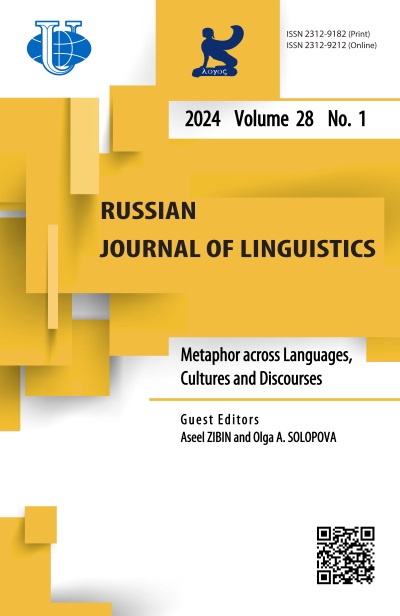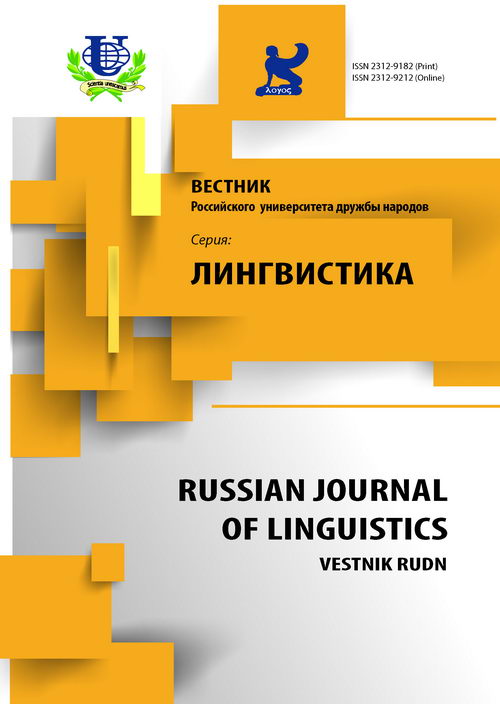No 2 (2009)
- Year: 2009
- Articles: 15
- URL: https://journals.rudn.ru/linguistics/issue/view/569
Articles
 5-10
5-10


 11-18
11-18


 19-25
19-25


 26-30
26-30


Usage of pronouns and verbs in Cortazar's novel «Rayuela» as reflection of decentralized vision of world
Abstract
This article analyses the usage of personal pronouns and impersonal verbs in Cortazar's novel «Rayuela». These forms are being examined in connection with relations between «I» and «The Other». The semantics of unusual usage of plural forms and impersonal verbs in the Cortazar's text is connected with the fictitious nature of hero's personality limits, and represents the author's personality as multiple one. This fact reflects the decentralized, probabilistic picture of world, created by Julio Cortazar.
Russian Journal of Linguistics. 2009;(2):31-37
 31-37
31-37


Phonetical features of portuguese language regional varients
Abstract
The article explains the features of consonant system of Portuguese language in African, Asian and Latin American countries, by using websites on English and Portuguese language. The transcription given on these websites is preserved in this article.
Russian Journal of Linguistics. 2009;(2):38-42
 38-42
38-42


Axiological meaning of idioms and its representation in illustrative examples of dictionaries
Abstract
The article is devoted to lexicographic description of idioms. Special groups of idioms have been specified, along with the types of illustrative examples conveying axiological meaning of idioms. The obtained results help to identify interrelations between the group an idiom belongs to, and the way its axiological meaning is represented in a dictionary example.
Russian Journal of Linguistics. 2009;(2):43-49
 43-49
43-49


Social-regulavive concept «fair play» in english linguaculture
Abstract
Linguacultural social-regulative concept «fair play» is analized in the article. The concept contains moral-ethic values (the highest orientations) and norms of behaviour. The role of fair play in the historic development of the Еnglish society is considered. Conceptual, figurative and value aspects of the concept «fair play» as ethnocultural value dominant of the english linguaculture are analized.
Russian Journal of Linguistics. 2009;(2):50-56
 50-56
50-56


 57-60
57-60


Functional and stylistic features of Swiss marked personal nouns
Abstract
The article intends to describe the most considerable functional features of Swiss marked personal nouns in fiction, social and political essays and to reveal their most substantial stylistic characteristics. The research shows the sources and factors causing functional features of Swiss marked vocabulary in general and of personal nouns in particular.
Russian Journal of Linguistics. 2009;(2):61-71
 61-71
61-71


 72-76
72-76


Functional-stylistic identification of Arab publicity written speech (APWS)
Abstract
This article is dedicated to characteristics of Arab publicistic written speach, which is distinguished by following particular features: emotionality, expressivenoss and many others, that may be expressed via various means of the modern Arab language.
Russian Journal of Linguistics. 2009;(2):77-84
 77-84
77-84


On lexical borrowings from the Catalan, Galician and Basque languages in Spanish political speech
Abstract
The article explores and classifies Spanish borrowings (such as certain toponyms, anthroponyms, and precedent text fragments) from official provincial languages of Spain (Catalan, Galician, Basque) in political speech of this country.
Russian Journal of Linguistics. 2009;(2):85-90
 85-90
85-90


Representation of the concept «space» according to the toponimic data of the Zabaikalye region
Abstract
The paper deals with the representation of the concept «space» according to the Zabaikalye region toponimic space data. The author comes to the conclusion that this concept is very important for the reconstruction of the East Zabaicalye first residents linguistic picture of the world.
Russian Journal of Linguistics. 2009;(2):91-98
 91-98
91-98


Interuniversity scientific conference «Language as integrity. G.P. Melnikova's system linguistics»
Russian Journal of Linguistics. 2009;(2):99-100
 99-100
99-100

















